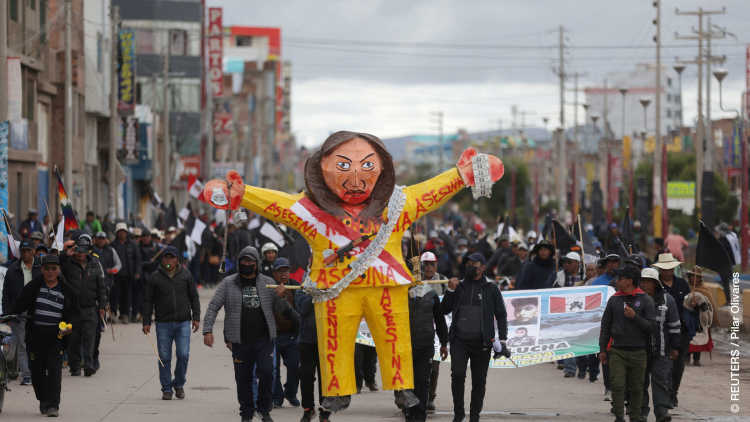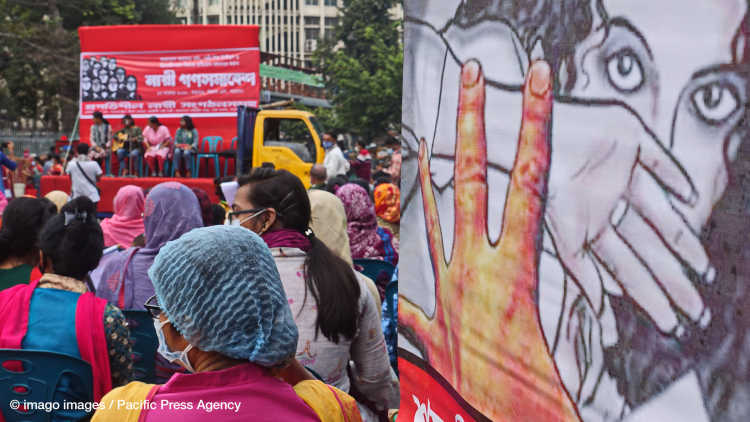- Home
- Publications
- GIGA Focus
- Crisis in the Andes: The Rise (and Fall?) of Two Women Leaders
GIGA Focus Latin America
Crisis in the Andes: The Rise (and Fall?) of Two Women Leaders
Number 6 | 2023 | ISSN: 1862-3573

Viewed as political outsiders, women represent desperately needed political renewal. Amid crises, they face not only opportunities but also added challenges, amplifying existing gendered hurdles in the political sphere. Jeanine Añez’s and Dina Boluarte’s experiences in Bolivia and Peru epitomise this, prompting discussions on potential implications for upcoming women in politics.
After the contentious departures of the presidents of Bolivia and Peru, two women assumed power: Jeanine Añez and Dina Boluarte, respectively. While constitutional successions, their appointments were marked by controversy. On the one hand, members of the opposition to the ousted presidents praised the historical assumptions of the presidency by women. On the other, the former presidents’ supporters questioned the legitimacy of Añez and Boluarte and their ability to govern independently of the opposition’s male politicians.
These women’s mandates have been shaped by public protest and low levels of approval. Online and on the streets, negative stereotypes against women’s leadership and political presence have been echoed.
Añez, who is no longer in power, is currently in jail facing a legal process that has ignited strong concerns from human rights bodies and international organisations such as the UN and the European Parliament. This is not only political retaliation but also shows signs of gendered political violence. Similar legal challenges might follow Boluarte once a new president is elected. Particularly if he or she comes from the lineage of Pedro Castillo.
Policy Implications
Women might face an electoral advantage because, as political outsiders, they are perceived as political renewal. Yet, becoming insiders, particularly in times of crisis, might bring negative consequences in furthering the stereotypes associated with all women in power – particularly as presidents. The biases regarding Añez and Boluarte could negatively affect women in political office overall.
A Context of Political Instability, Social Discontent, and Abuse of Authority
In the complex landscape of Latin American politics, women often emerge as political outsiders, symbolising the prospect of much-needed political renewal. However, the journey for women in politics becomes even more challenging during times of political crisis, as demonstrated by the experiences of Jeanine Áñez in Bolivia and Dina Boluarte in Peru respectively. Both women came to office amid power struggles, protests, and social discontent in their respective countries. However, the substantial shortcomings of their administrations not only resulted in low approval ratings but also gave rise to pervasive negative stereotypes, in scrutinising aspects of their physical appearance and political agency – signalling troubling signs of gendered political violence. This may deter future female candidates, perpetuating gender-based inequalities in political representation.
In October 2019, the presidential elections in Bolivia sparked unrest in the country following a disputed outcome that would have secured Evo Morales a fourth term in office. Irregularities and suspected fraud fuelled widespread protests, ultimately leading to Morales’ resignation and his subsequent exile in Mexico. Thereafter, a series of further resignations ensued, culminating in the ascent of Jeanine Áñez, the second vice president of the Senate from the opposition party Movimiento Demócrata Social, to the interim presidency on 12 November 2019, in accordance with the established constitutional line of succession. Áñez faced accusations of politically targeting rival Movimiento al Socialismo (MAS) supporters and came under criticism for enacting a controversial decree (Supreme Decree No. 4078) seeking to absolve the armed forces from criminal liability for their actions. Additionally, MAS supporters accused Áñez of having orchestrated a coup against Morales.
These events, coupled with deep-seated political divisions between MAS supporters and their opponents, ignited violent protests across the country. This resulted in approximately 30 fatalities due to the use of excessive force by the security forces. The protests subsided around 23 November, following an agreement between the new government and MAS representatives that new elections would be held in October 2020.
In 2022, Peru was experiencing a similar political crisis. Pedro Castillo, a schoolteacher and union leader, had become president of the country in 2021 through an unexpected victory at the ballot box. His support base primarily hailed from Peru’s southern regions, areas that had long felt neglected by the state. During his presidency, Castillo was beset by allegations of corruption as well as opposition in Congress.
Facing a third impeachment attempt on 7 December, Castillo surprised many by announcing his intention to dissolve Congress – therewith initiating an autogolpe (“self-coup”). This move prompted the resignation of cabinet members and government officials, while the military and police both refused to support Castillo. Subsequently, he was arrested on charges of conspiracy and rebellion and then successfully impeached.
Previously being Castillo’s vice president, Dina Boluarte now assumed the country’s highest office – making her Peru’s first female president. These events alongside enduring social discontent triggered protests against Boluarte and Congress. Demonstrators demanded a Constituent Assembly for a new Constitution, moving forward general elections to renew the presidency and Congress, as well as the release of Castillo. The protests quickly turned violent, leaving 50 people dead and 821 injured – allegedly at the hands of the security forces, according to an OHCHR report (2023). Hence, Boluarte’s administration has been marked particularly by the deployment of excessive force against protesters – with her being labelled Peru’s first woman dictator and her government authoritarian. Calls for bringing forward a general election grew louder, with several bills proposing an earlier date; these were rejected by Congress, however.
The Use of Gender Stereotypes
Positive stereotypes attached to women have the potential to be particularly relevant in times of political crisis. There is the perception that women possess communal attributes such as empathy, warmth, and nurturance, which often position them as more collaborative and empathetic leaders than their male counterparts (Eagly and Karau 2002). These qualities are perceived as conducive to mitigating conflict, fostering stability, and aiding reconciliation. Therefore, women’s leadership can be perceived as advantageous when political upheaval erupts.
Moreover, women face an advantage when there is general dissatisfaction with political parties and traditional politics, as is the case in both Bolivia and Peru. Women are often perceived as political outsiders, tapping into the belief that they bring a fresh perspective and a departure from established political norms. This can be strategically employed by their parties to signal a commitment to political renewal (Schwindt-Bayer 2010).
Añez, Boluarte, and their supporters themselves strategically leveraged such positive perceptions associated with women, particularly their roles as mothers, to reinforce their image as pacifiers and capable rulers amid the social and political conflicts besetting their respective countries. In her “Address to the Nation” on 28 July, Boluarte remarked: “I am a woman of peace, dialogue, consensus, and someone who believes in democracy” (“Soy una mujer de paz, dialogante, concertadora y que cree en la democracia”). In a similar discourse in the context of Bolivia’s celebration of 195 years of independence, Añez announced:
I know perfectly well, because I have lived it, the sacrifice made for one’s family. As a woman, as a mother, and as a president, I am aware that challenging paths are navigated by helping each other. No one can do it alone (Yo sé, perfectamente, porque lo he vivido, sacrificarse por la familia. Como mujer, como madre y como presidenta sé ha conciencia que los caminos difíciles se andan ayudándonos unos a otros. Nadie puede sin ayuda).
Yet, detractors of both Áñez and Boluarte resorted to questioning their womanhood, engaging in a form of gender-based dehumanisation. This manifested in the use of derogatory language, such as questioning their femininity or using demeaning terms that aimed to strip away their identity as women. The rise of women to political leadership positions has been accompanied by a disturbing trend of employing such misogynistic language and tropes, aimed ultimately at undermining their authority and discrediting their capacity to rule (Eagly and Carli 2007; Krook and Restrepo Sanín 2019; Norris, Welzel, and Inglehart 2002).
The accession to power of Áñez in Bolivia and Boluarte in Peru, along with public discontent at the opacity of the respective transition processes as well as subsequent abuses of power, saw the use of misogynistic tropes against women in politics once more. Their detractors employed language targeting aspects of their bodies, morals, and capabilities as women – criticisms rarely directed at male politicians – in their attacks on Áñez and Boluarte. A series of tweets, memes, and chants on the streets reveal a disturbing pattern to the gender-based abuse seeking to undermine women’s political authority.
As noted, women politicians are often evaluated and subjected to scrutiny based on their appearance in ways distinct from how their male counterparts are treated (Huddy and Terkildsen 1993). Women are frequently judged based on their clothing, hairstyle, and overall grooming, diverting attention from their political competence (Dolan and Lynch 2016). Any deviation from traditional beauty norms can result in severe condemnation.
There was, for example, controversy about whether Boluarte had undergone a particular cosmetic procedure or not (Cosas n.d.). Her “Mensaje a la nación” on Peru’s Independence Day, where she expressed regret for the deaths that had occurred during protests, was unfortunately overshadowed by a distracting discussion about her physical appearance. Despite the gravity of the issues addressed in her speech, some critics chose to focus on speculation about whether she had undergone said procedure (Sin Censura 2023). This not only served to detract from the significance of her message, which included a rare acknowledgment of responsibility for tragic events, but also underscored the unfortunate tendency to prioritise superficial discussions over substantive matters in Latin American political discourse.
In the case of Áñez, meanwhile, critics homed in on her hair colour as a way to diminish her apparent political legitimacy. By labelling her a peliteñida (“dyed blonde”) and associating this with her assumption of the presidency, her detractors sought to imply that Áñez was attempting to conform to Eurocentric beauty standards associated with whiteness and privilege. Moreover, to some, her decision to dye her hair blonde was a sign of racism by trying to hide her indigenous roots.
The language used here not only objectified Áñez but also helped perpetuate racial stereotypes:
Jeanine Áñez, upon proclaiming herself blonde and president of #Bolivia, the dyed blonde became the first Latin American dictator (Jeanine Áñez al autoproclamarse rubia y presidenta de #Bolivia, la peliteñida se convirtió en la primera Dictadora latinoamericana) (@rodolfoCeniz 13 November 2019);
Dead bodies on the streets of Bolivia. Guilty is the Dictator Jeanine Áñez. An old prostitute, denigrating her own race. Just because she wants to appear blonde (Muertos en las calles de nuestra hermana Bolivia. Culpable la Dictadora Jeanine Áñez. Una vieja prostituta, que denigra de su raza. Porque quiere verse rubia). (@achirino4 2 August 2020)
In the same vein, despite running on Castillo’s ticket and presenting herself as an ally of indigenous causes during his campaign, Boluarte’s appearance and ascent to power also sparked scepticism about her indigeneity.
Immediately recognised as a misti – a term used among Quechua-speaking peasants to describe those who are not part of their community but consider themselves superior and seek to take advantage of that status – Boluarte ended up sending a message contrary to the one she intended. A misti president attempting to deceive and manipulate aligns perfectly with the image of a treacherous leader who ascended to power by declaring her intention to remain in the Government Palace until 2026.
Reconocida inmediatamente como una misti -palabra que designa entre los campesinos quechuas a quienes no lo son, pero además se consideran superiores y buscan aprovecharse de esa condición- Boluarte terminó enviado un mensaje contrario al que buscaba. Una presidenta misti buscando engañar y manipular, calza perfectamente con la imagen de una mandataria traidora, que se encaramó en el poder mencionando que se quedaría en Palacio de Gobierno hasta el 2026. (Pajuelo Teves 2023)
Such criticism of Áñez’s and Boluarte’s racial identity becomes particularly pertinent in the context of street protests, where a significant portion of the mobilised populations had indigenous roots. Moreover, state repression and the number of demonstrators killed disproportionately impacted indigenous communities. By denigrating Áñez for appearing “blonde” and Boluarte for being a misti, these were not only personal attacks but also exploiting deeply rooted racial and cultural divisions in the two countries. These critiques, therefore, not only attempted to diminish the political legitimacy of the two leaders but also to exacerbate tensions related to race and identity within the broader social and political landscape.
Another common criticism of Áñez and Boluarte concerned their respective ages. Áñez was 52 and Boluarte 60 years old when they assumed their countries’ highest office – making the former younger than Morales and the latter only seven years older than Castillo, respectively. Yet they were often qualified as viejas – old women.
Damn Jeanine Áñez, old murderer, and ugly (Maldita jeanine Áñez vieja asesina y fea) (@Carolin15422400 10 December 2019);
Dina Boluarte is not a mother; she’s an old piece of sh*t who is scared, her hands are stained with blood (Dina Boluarte no es madre, es una vieja de mrd que está con miedo, sus manos están manchadas de sangre). (@JamesShigeta 14 May 2023)
The literature on ageism and women in politics underscores the pervasive challenges faced by female political figures, particularly as they navigate societal expectations and stereotypes related to aging. Ageism, as it intersects with sexism, poses a formidable barrier for women in politics, subjecting them to heightened scrutiny and reinforcing traditional gender roles. Women are criticised for both appearing too young and too old, illustrating the complex and contradictory expectations placed on them (Eagly and Carli 2007).
Not only were their physical attributes and age highly scrutinised, but Áñez and Boluarte also both found their political agency extensively questioned. In general, there is a persistent trend of contesting women’s involvement in politics on the basis of them being portrayed as mere puppets. Emphasising how women may be manipulated or controlled by external forces diminishes their perceived autonomy (Krook 2017). Moreover, women’s agency is frequently undermined by the notion of “tokenism” – whereby their presence in politics is perceived as but a symbolic gesture rather than a reflection of genuine empowerment. Áñez and Boluarte were, accordingly, perceived as puppets of the elites, with it instead being political opponents pulling the strings behind the scenes and ultimately driving the decision-making and governance processes witnessed.
#Jeanine Áñez [...] is the puppet of Rubén Costas and Doria Medina [...] it is evident from afar that the said lady does not think for herself; others think for her [...] #The presidency fell into her lap by pure luck [...] (#Jeanine Áñez... es la títere de Rubén Costas y Doria Medina... a leguas se nota que la dicha Sra no piensa, se lo piensan... #La presidencia lo cayó de pura suerte...) (@jaimeveracopa 2 May 2020);
No democratic government can recognise the coup plotter Jeanine Áñez, puppet of the oligarchic and racist sectors of Bolivia (Ningún gobierno que se declare democrático puede reconocer a la golpista Jeanine Áñez, títere de los sectores oligárquicos y racistas de Bolivia) (@Cele_Fierro 16 November 2019);
We all know that Dina Boluarte is a puppet, a hologram, or perhaps a mirage within the Palace. We all know that Keiko Fujimori governs in the shadows, supported by both the extreme left and right. Supported by those media outlets that sold their editorial stance to Fujimorism and by powerful groups who manipulate and depose presidents at will (Todos sabemos que Dina Boluarte es una títere, un holograma o tal vez un espejismo dentro de Palacio. Todos sabemos que Keiko Fujimori gobierna en la sombra apoyada por la izquierda y derecha extrema. Apoyada por esos medios de comunicación que vendieron su línea editorial al fujimorismo y por los grupos de poder, esos que ponen y sacan presidentes). (@vekace82_laley 19 August 2023)
The most harmful aspect here lies in the hypersexualisation and demeaning treatment of Áñez and Boluarte. Certain terms employed to describe them included “prostitute” or “whore” (piruja). In the case of Áñez, even a fabricated pornographic video of her circulated widely on social media. This not only devalues their actions as politicians, but is furthermore a form of perverse gendered political violence that perpetuates harmful stereotypes against women. The literature on the latter’s participation in politics consistently underscores the pervasive and damaging phenomenon of hypersexualisation, used as a weapon against women political figures (Krook and Restrepo Sanín 2019). The objectification of women in politics – meaning the deliberate use of sexually charged language, derogatory terms, and the dissemination of manipulated images or fabricated content, as observed in the case of Áñez – functions as a tool of violence, serving to perpetuate power imbalances and reinforce patriarchal norms.
A pornographic video of the usurpadora ‘president’ of #Bolivia, Jeanine Áñez, is circulating on the Internet; thereby confirming that a prostitute has ascended to power and, in retaliation against the people, granted licence to the police and military to kill (Circula por la red vídeo pornográfico de la usurpadora ‘presidente’ de #Bolivia, Jeanine Áñez; con ello se confirma que una prostituta asciende al poder y en represalia con el pueblo, otorgó a policías y militares, licencia para matar) (@pablotraven 18 November 2019);
This ordinary whore, also known as ‘Dina Dynamite’ (Esta piruja ordinaria alias ‘dina dinamita’). (@Paola57287217 6 August 2021)
What’s Next
Despite the tumultuous political climate, concerns about the legitimacy of her presidency, and allegations of human rights abuses during her tenure, Áñez still decided to run for the presidency of Bolivia. As the political landscape evolved, however, she ultimately opted to withdraw from the presidential race in September 2020. Morales’s political party secured a majority of votes in the elections held during Áñez’s interim tenure. In what some characterised as retaliatory, the judicial branch, allegedly acting under the executive’s directives, undertook legal proceedings against Áñez on charges of sedition. The primary accusers in this matter were the Public Prosecutor’s Office, the General Attorney’s Office, and the Ministry of Government (Interior). They together alleged that Áñez had assumed the presidency improperly during the political crisis of 2019. In June 2022, the judiciary ruled to hand down a 10-year prison term to the former interim president in the “Coup II” case.
In October 2023, the Public Prosecutor’s Office filed charges of genocide against the incarcerated former interim president for her involvement in a violent crackdown on protesters that had resulted in 19 deaths. The attorney general is pursuing a regular legal process rather than the impeachment trial that Áñez has requested from prison. Despite criticism from human rights bodies and international organisations regarding the judicial proceedings against Áñez, there appears to be a lack of substantial rallying around her within Bolivia – particularly from members of the opposition. The absence of significant support from civil society, and notably from the feminist organisations that were vocally critical of her government, underscores the complex and divisive nature of Áñez’s tenure as interim president. This absence of unified backing within the country suggests a nuanced and polarised response to her leadership, even among groups that might be expected to align against what has been an internationally criticised judicial process.
Boluarte, meanwhile, is currently still in power. Her continued tenure is puzzling given the widespread disapproval among Peruvians both of her and of Congress. Despite such public discontent, protests have waned; in response to the failure to bring forward elections, Boluarte announced in June 2023 that she plans to remain in power until 2026.
Boluarte’s hold on power might endure because, first and foremost, she enjoys substantial support from both Congress and the military – marking a contrast to her predecessor, Castillo. Furthermore, despite facing investigation for her role in the death of protesters, Peru’s Constitution provides a shield to her. It stipulates that presidents and parliamentarians are immune from trial for alleged crimes committed in the course of their duties.
While these reasons potentially explain her persistence in power, Manuel Merino promptly resigned after only five days in office in 2020 following two protest-related deaths. Boluarte continues to hold Peru’s highest office, however, despite accusations of being responsible for a much higher toll of 50 protest-related fatalities. Positive stereotypes about women might provide Boluarte with an advantage in holding onto her leadership against this backdrop. As mentioned, women are often portrayed as less conservative, more benevolent, and as non-violent compared to their male counterparts. Some portion of the Peruvian population, particularly among Castillo’s detractors, might leverage these favourable perceptions to help mitigate Boluarte’s transgressions.
Yet, Boluarte’s future might eventually come to resemble that of Áñez. Both lack affiliation with any political party in Congress, both lack support from civil society, and both have seen feminist movements refrain from supporting their respective administrations – in emphasising that Añez and Boluarte do not represent women. In Peru, the phrase “ni una mujer con Dina” (“not a woman with Dina”) is widely heard on social media and the country’s streets alike.
Possible Consequences for Women in Politics
The administrations of Añez and Boluarte were deemed inadequate, falling short of expectations – particularly in relation to gendered considerations. Instances of power abuses, severe repression, and suboptimal state management failed to align with prevailing gendered norms.
I believed in you because you are a woman and a mother, but you have disqualified yourself due to your lust for power and repression, not in defence of democracy. Your crimes are crimes against humanity (Creí en usted por ser mujer y madre pero se ha descalificado por su ceguera del poder y la represión y no la defensa de la democracia, sus crímenes de lesa humanidad). (Susana Baca, singer and former Minister of Culture of Peru; @AnibalGarzon 16 January 2023)
Such shortcomings bear potential consequences for aspiring women in politics, given their already limited representation in this sphere. The actions of prominent females in politics, including presidents, contribute significantly to the shaping of stereotypes applied universally to women taking up such roles (Osorio Michel 2023). Women may not necessarily benefit from positive electoral advantages associated with feminine stereotypes. Furthermore, there exists the possibility of a backlash against women in general, with potential penalties for the actions of Añez and Boluarte impacting the broader perception of women in political leadership roles across Bolivia and Peru.
Poor thing, the genocidal bitch Dina Boluarte, she is not liked, yet she is enthroned in power as a dictator, the mistress and owner of all of Peru, just like the coup plotter in Bolivia. Women are worse than men when they are in power (Pobresita la perra genocida de la dina Boluarte no la quieren y está entronizada en el poder como dictadora ama y dueña de todo el Perú igualita a la golpista de Bolivia las mujeres son peores que los hombres cuando están en el poder). (@el_bond1 20 January 2023)
Furthermore, the threat of violence against women politicians poses a significant deterrent to potential female candidates seeking political office. The spectre of gender-based violence, including verbal attacks, can dissuade women from participating in politics (Krook and Restrepo Sanín 2019). The fear of reprisals, given the experiences of Añez and Boluarte, not only limits women’s agency but also has the potential to perpetuate gender-based inequalities in political representation in Bolivia and Peru alike.
Footnotes
References
Cosas (n.d.), El nuevo perfil de Dina Boluarte, accessed 11 December 2023.
Dolan, Kathleen A., and Timothy Lynch (2016), The Impact of Gender Stereotypes on Voting for Women Candidates by Level and Type of Office, in: Politics and Gender, 12, 3, 573–595, accessed 11 December 2023.
Eagly, Alice H., and Linda Carli (2007), Overcoming Resistance to Women Leaders: The Importance of Leadership Style, in: Barbara Kellerman, and Deborah L. Rhode (eds), Women and Leadership: The State of Play and Strategies for Change, Hoboken, NJ: Wiley, 127–148.
Eagly, Alice. H., and Steven J. Karau (2002), Role Congruity Theory of Prejudice toward Female Leaders, in: Psychological Review, 109, 3, 573–598, accessed 11 December 2023.
Huddy, Leonie, and Nayda Terkildsen (1993), Gender Stereotypes and the Perception of Male and Female Candidates, in: American Journal of Political Science, 37, 1, 119, accessed 11 December 2023.
Krook, Mona Lena (2017), Violence Against Women in Politics, in: Journal of Democracy, 28, 1, 74–88, accessed 11 December 2023.
Krook, Mona Lena, and Juliana Restrepo Sanín (2019), The Cost of Doing Politics? Analyzing Violence and Harassment against Female Politicians, in: Perspectives on Politics, 18, 3, 740–755, accessed 11 December 2023.
Norris, Pippa, Christian Welzel, and Ronald Inglehart (2002), Gender Equality and Democracy, in: Comparative Sociology, 1, 3, 321–345, accessed 11 December 2023.
OHCHR (2023), Observations on the Human Rights Situations in the Context of the Protest in Peru, 19 October, accessed 11 December 2023.
Osorio Michel, Daniela (2023), Bias in Perceptions of Political Gender Leadership in Latin America, Nashville, TN: Vanderbilt University.
Pajuelo Teves, Ramón (2023), La presidenta “misti”, el titiritero y el descontento campesino-indígena, 15 January, accessed 15 December 2023.
Schwindt-Bayer, Leslie A. (2010), Political Power and Women’s Representation in Latin America, Oxford: Oxford University Press.
Sin Censura (2023), ¿Dina Boluarte se operó la nariz y se aplicó botox en el rostro?, accessed 11 December 2023.
Editor GIGA Focus Latin America
Editorial Department GIGA Focus Latin America
Regional Institutes
Research Programmes
How to cite this article
Osorio Michel, Daniela, and Johanna Pieper (2023), Crisis in the Andes: The Rise (and Fall?) of Two Women Leaders, GIGA Focus Latin America, 6, Hamburg: German Institute for Global and Area Studies (GIGA), https://doi.org/10.57671/gfla-23062
Imprint
The GIGA Focus is an Open Access publication and can be read on the Internet and downloaded free of charge at www.giga-hamburg.de/en/publications/giga-focus. According to the conditions of the Creative-Commons license Attribution-No Derivative Works 3.0, this publication may be freely duplicated, circulated, and made accessible to the public. The particular conditions include the correct indication of the initial publication as GIGA Focus and no changes in or abbreviation of texts.
The German Institute for Global and Area Studies (GIGA) – Leibniz-Institut für Globale und Regionale Studien in Hamburg publishes the Focus series on Africa, Asia, Latin America, the Middle East and global issues. The GIGA Focus is edited and published by the GIGA. The views and opinions expressed are solely those of the authors and do not necessarily reflect those of the institute. Authors alone are responsible for the content of their articles. GIGA and the authors cannot be held liable for any errors and omissions, or for any consequences arising from the use of the information provided.

















